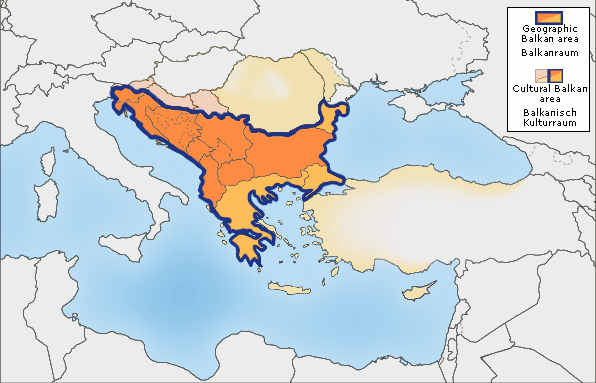Nature and natural resources
Most of the area is covered by mountain ranges running from the northwest to southeast. The main ranges are the Balkan mountains
(Stara Planina), running from the Black Sea coast in Bulgaria to the border with Serbia, the Rilo-Rhodope massif in southern Bulgaria,
northern Greece and southeastern North Macedonia, the Dinaric Alps in Bosnia and Herzegovina, Croatia and Montenegro, the Šar massif
which spreads from Albania to North Macedonia, and the Pindus range, spanning from southern Albania into central Greece and the Albanian
Alps. The highest mountain of the region is Rila in Bulgaria, with Musala at 2925 m, Mount Olympus in Greece, being second at 2917 m and
Vihren in Bulgaria being the third at 2914 m. The karst field or polje is a common feature of the landscape.
On the Adriatic and Aegean coasts the climate is Mediterranean, on the Black Sea coast the climate is humid subtropical and oceanic, and
inland it is humid continental. In the northern part of the peninsula and on the mountains, winters are frosty and snowy, while summers
are hot and dry. In the southern part winters are milder. The humid continental climate is predominant in Bosnia and Herzegovina, northern
Croatia, Bulgaria, Kosovo & Metochia*, northern Montenegro, the Republic of North Macedonia, the interior of Albania and Serbia, while the
other, less common climates, the humid subtropical and oceanic climates, are seen on the Black Sea coast of Bulgaria and Balkan Turkey
(European Turkey); and the Mediterranean climate is seen on the coast of Albania, the coast of Croatia, Greece, southern Montenegro and the
Aegean coast of Balkan Turkey (European Turkey).
Over the centuries forests have been cut down and replaced with bush. In the southern part and on the coast there is evergreen vegetation.
Inland there are woods typical of Central Europe (oak and beech, and in the mountains, spruce, fir and pine). The tree line in the mountains
lies at the height of 1800–2300 m. The land provides habitats for numerous endemic species, including extraordinarily abundant insects and
reptiles that serve as food for a variety of birds of prey and rare vultures.
The soils are generally poor, except on the plains, where areas with natural grass, fertile soils and warm summers provide an opportunity
for tillage. Elsewhere, land cultivation is mostly unsuccessful because of the mountains, hot summers and poor soils, although certain
cultures such as olive and grape flourish.
Resources of energy are scarce, except in Kosovo & Metochia*, where considerable coal, lead, zinc, chromium and silver deposits are located.
Other deposits of coal, especially in Bulgaria, Serbia and Bosnia, also exist. Lignite deposits are widespread in Greece. Petroleum scarce
reserves exist in Greece, Serbia and Albania. Natural gas deposits are scarce. Hydropower is in wide use, from over 1,000 dams. The often
relentless bora wind is also being harnessed for power generation.
Metal ores are more usual than other raw materials. Iron ore is rare, but in some countries there is a considerable amount of copper, zinc,
tin, chromite, manganese, magnesite and bauxite. Some metals are exported.
History and geopolitical significance
Antiquity
The Balkan region was the first area in Europe to experience the arrival of farming cultures in the Neolithic era. The Balkans have been
inhabited since the Paleolithic and are the route by which farming from the Middle East spread to Europe during the Neolithic (7th
millennium BC). The practices of growing grain and raising livestock arrived in the Balkans from the Fertile Crescent by way of Anatolia
and spread west and north into Central Europe, particularly through Pannonia. Two early culture-complexes have developed in the region,
Starčevo culture and Vinča culture. The Balkans are also the location of the first advanced civilizations. Vinča culture developed a form
of proto-writing before the Sumerians and Minoans, known as the Old European script, while the bulk of the symbols had been created in the
period between 4500 and 4000 BC, with the ones on the Tărtăria clay tablets even dating back to around 5300 BC.
The identity of the Balkans is dominated by its geographical position; historically the area was known as a crossroads of cultures. It
has been a juncture between the Latin and Greek bodies of the Roman Empire, the destination of a massive influx of pagan Bulgars and Slavs,
an area where Orthodox and Catholic Christianity met, as well as the meeting point between Islam and Christianity.
In pre-classical and classical antiquity, this region was home to Greeks, Illyrians, Paeonians, Thracians, Dacians, and other ancient
groups. The Achaemenid Persian Empire incorporated parts of the Balkans comprising Macedonia, Thrace, Bulgaria, and the Black Sea coastal
region of Romania between the late 6th and the first half of the 5th-century BC into its territories. Later the Roman Empire conquered
most of the region and spread Roman culture and the Latin language, but significant parts still remained under classical Greek influence.
The Romans considered the Rhodope Mountains to be the northern limit of the Peninsula of Haemus and the same limit applied approximately
to the border between Greek and Latin use in the region (later called the Jireček Line). However large spaces south of Jireček Line were
and are inhabited by Vlachs (Aromanians), the Romance-speaking heirs of Roman Empire. The Bulgars and Slavs arrived in the 6th-century
and began assimilating and displacing already-assimilated (through Romanization and Hellenization) older inhabitants of the northern and
central Balkans, forming the Bulgarian Empire.[58] During the Middle Ages, the Balkans became the stage for a series of wars between the
Byzantine Roman and the Bulgarian Empires.
Early modern period
By the end of the 16th-century, the Ottoman Empire had become the controlling force in the region after expanding from Anatolia through
Thrace to the Balkans. Many people in the Balkans place their greatest folk heroes in the era of either the onslaught or the retreat of
the Ottoman Empire. As examples, for Greeks, Constantine XI Palaiologos and Kolokotronis; and for Serbs, Miloš Obilić and Tzar Lazar;
for Montenegrins, Đurađ I Balšić and Ivan Crnojević; for Albanians, George Kastrioti Skanderbeg; for ethnic Macedonians, Nikola Karev and
Goce Delčev; for Bulgarians, Vasil Levski, Georgi Sava Rakovski and Hristo Botev and for Croats, Nikola Šubić Zrinjski.
Most of the Balkan nation-states emerged during the 19th and early 20th centuries as they gained independence from the Ottoman Empire or
the Austro-Hungarian empire: Greece in 1821, Serbia, Montenegro in 1878, Romania in 1881, Bulgaria in 1908 and Albania in 1912.
Events
ICFF Manaki Brothers, Bitola, North Macedonia - International Cinematographers Film Festival Manaki Brothers held in Bitola every year
September-October. Popular in the region and the festival has great connection with France.
Guča festival, Guča, Serbia - An annual trubački (trumpet) music festival held in the summer. This genre of music is best known as ethnic
jazz, and is best played by the Balkan Roma people. 6-12th of August
EXIT Festival, Novi Sad, Serbia - An annual rock festival held in early July, which many musicians and bands from all over Europe attend.
Ohrid Summer Festival, Ohrid, Macedonia - An international culture festival held annually from July through August.
Acrobatics festival, Krupa na Vrbasu, BiH - Circus skills in the canyon.
Activities
Peaks of the Balkans Hike - The only permitted and guided hike of its kind. The trail and peace park concept is a nominee for the 2013
World Tourism Awards, and with this new project, border-crossing procedures for hikers have been simplified and a mountain security system
has been established.
Winter sports
Kosovo & Metochia* - Climbing Hajla Summit 2403m
Bosnia and Herzegovina was the host for the 1984 Winter Olympics, and after the 1990s, the alpine facilities are well restored. Around
Sarajevo and Travnik are Olympic-grade mountains.
In Serbia, you can ski in Kopaonik and Zlatibor.
Eat
Balkan cuisine is one of the most exquisite one. The most popular dishes are cevapcici, pljeskavica or sarma. The most popular fast food
is called burek. It's usually stuffed with meat, cheese or spinach. You can also see mjesano meso option in menu cards. There's a all kind
of mentioned meats on one plate dish. There're fishes and sea food popular in Croatian or Montenegrin coast.
Drink
Regional firewater of choice is rakija (spelling varies from country to country; very similar to Turkish raki), a hard liquor (around 40%,
and can be higher if home-made) common to all countries in Balkans. Rakija is distilled out of just about any fruit grown in the region,
with the most popular varieties being plum, apricot, mulberry, and grape.
Another local drink is boza, a thick and sweet ale made of millet, maze, or wheat with a very low (less than 1%) alcohol content and
traditionally drunk in winters.
There are excellent local beers to be had in each country in the region. Wine is also common, the peninsula being dotted by vineyards
from one end to another.
Low taxes on alcohol coupled with a laid-back lifestyle and a liberal attitude towards alcohol consumption mean even smaller towns in
the region has a considerable nightlife scene. Belgrade in particular is noted as the region's party hotspot.








